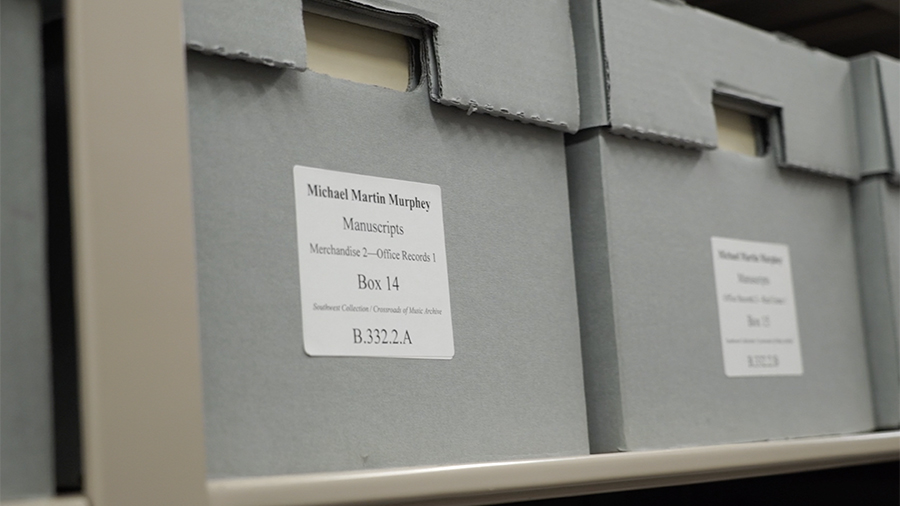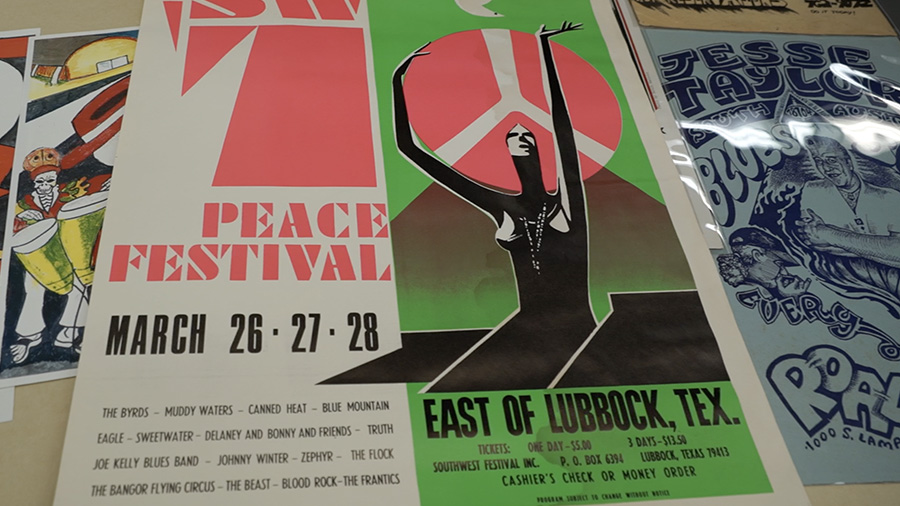A Little Rock, a Little Country & a Lot More
By: Kaitlyn Hale; Video by Jason Cannon
John Steinbeck once said that Texas is a state of mind, and there are those who will tell you that Texas music is as individual and iconic as the state it comes from.
With the meteoric rise of rock and roll pioneers Buddy Holly, Buddy Knox and Jimmy Gilmer and the Fireballs in the 1950s and 60s, people began to take notice of Lubbock and West Texas music.
The man behind much of Lubbock's music scene from the 1970s forward is Don Caldwell, a musician and record producer who has recorded the Maines Brothers Band, Joe Ely, Terry Allen, Butch Hancock, Johnny Ray Watson and many others. When the original location of Don Caldwell Studios at 1214 Avenue Q closed in December 1999, his tape library of 5,000 master tapes were put into barns and storage sheds.
“I was like, wow there's so much great stuff in that tape library,” Curtis Peoples, Crossroads of Music Archive archivist in the university's Southwest Collection/Special Collections Library, and former employee of Caldwell Studios, said. “There's the Maines Brothers, Pat Green, Jesse Taylor, Joe Ely and Jack Neal, who played with Buddy Holly. There's just a whole lot of West Texas musicians there that I think deserved to be preserved.”
Peoples, a musician himself, was working for Texas Tech's Vietnam Center and Archive at the time. He feared the West Texas dust and weather would ruin the tapes, so, he approached Caldwell, the University Libraries' dean and the Southwest Collections' director about moving the collection to Texas Tech. Caldwell's tapes would eventually be the cornerstone of the Crossroads of Music Archive, and Peoples would move into the position as archivist.
The same year the Caldwell Studios closed, the Texas legislature passed a resolution naming Lubbock and West Texas the Music Crossroads of Texas. As the archive was being developed, Peoples took the new designation as inspiration for its name.
“The resolution was meant to promote the music industry in our region, and draw more attention to Lubbock,” said Robert Duncan, then a Texas State Senator who introduced the resolution and now chancellor of the Texas Tech University System. “It's great to see the name continue as part of an archive that will forever preserve the incredible talent of the area for future generations to study and appreciate.”

Today, the archive houses more than 120 collections, and includes among its inventory research material on Buddy Holly and Jesse “Guitar” Taylor and the oldest known recording of a Lubbock group from the Lubbock Quartet.
Peoples actively seeks underrepresented music forms in Texas. In his recent fieldwork, he began recording disappearing Mexican fiddle styles and songs. The collections have come from artists all over Texas, like country singer Michael Martin Murphey from Oak Cliff and the Kerrville Folk Festival and expands into music from the Southwest region of the United States. However, the main focus of the archive is on West Texas.
“It's just important to me to preserve the legacy of music in this area,” Peoples said. “I mean, I grew up here playing music. I remember as a child going to my grandmother's house, and the family would gather and play music. So it's always been a part of my life. I think music is a part of the social fabric of West Texas.”
Andy Wilkinson, a nationally known musician and the artist in residence at the archive, was on the original advisory board and helped Peoples secure several of its collections. He also stressed the importance of curating these works.
“The archive preserves the footprints, or maybe the tracks of a creative process, unlike any other entity can do,” Wilkinson said, “We provide a place for the failures as well as the successes. We want the page with the strikeouts on it. That's more important to us than the page with the finished print.”
Sometimes those pieces of a collection can be hard to find.
“Not everybody in the creative world keeps all their stuff,” Wilkinson said. “So you have to find someone who's creative and interesting, but also has something to archive.”
Wilkinson also pointed out that musicians don't have to be famous to have make an impact on the music industry. One of Wilkinson's favorite collections, for example, is about a man named Dow Patterson.
“He was in a band. The nephew of one of their band members was a young guy who couldn't play or sing very well at the time named John Deutschendorf, who became John Denver,” Wilkinson said.
Dow moved to Austin, where he continued to play music. One of his early roommates, Wilkinson said, was Jerry Jeff Walker, a top country recording artist. In the early 70s, Dow introduced Walker to the owner of Luckenbach, Texas, a very small central Texas town. In 1973, Walker recorded his gold record Viva Terlingua in Luckenbach. In 1976 Willie and Waylon recorded the song Luckenbach, Texas (Back to the Basics of Love), making the tiny town synonymous with progressive country, or outlaw music, that was becoming popular at the time. The town also served as the backdrop for some of Willie's Fourth of July picnics, further strengthening its ties to country music.
“Dow was dating at the time the daughter of the fella who owned Luckenbach. Dow was the one who introduced Jerry Jeff and Hondo Crouch,” Wilkinson said. “So the whole Luckenbach schtick came about through the happenstance of this guy Dow Patterson.”

The music is sometimes the easiest piece to get, Peoples said, because it's usually been produced and put on a record. However, there's just as much value in the creative process of each artist, and the collection keeps evidence of that as well.
A collection goes beyond the final record produced by a musician. Collections can include posters, flyers, lyrics, journals, songbooks, set lists, photos and more.
“You're preserving the culture of a region and a time and a place,” Wilkinson said, “and all that is connected to what's going on in the world politically. What's going on in the world culturally. What's going on in the world economically. Artists are the canaries in the coal mines. They let you know what's important before everybody else wakes up to it.”
Curtis Peoples hosts the “Music Crossroads of Texas” radio show on KTTZ 89.1 FM. Listen to the show.
The Crossroads of Music Archive is actively seeking new collections, such as music recordings, posters and handbills, photographs, oral histories, etc. The archive also accepts monetary donations through the Crossroads of Music Fund.
Please contact the Crossroads of Music Archive by email or at 806-834-5777 if you have materials to donate, or would like to help the project in some other manner.
Discoveries
-
Address
Texas Tech University, 2500 Broadway, Box 41075 Lubbock, TX 79409 -
Phone
806.742.3905 -
Email
vpr.communications@ttu.edu
